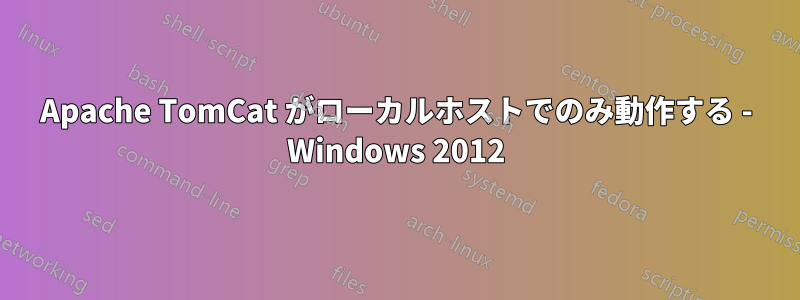
Windows Server 2012にApache Tomcatをインストールし、ローカルでアクセスできます。
これまで、次のことを試しました。 - ファイアウォール経由でポートを開く - クラウド サーバー ホスト経由でポートを開く - Windows ファイアウォールをオフにする - server.xml ファイルに変更を加える - クラウド サーバー ホストに連絡して、ポート 90 が動作していることを確認した - ホスティング プロバイダーに試してもらいましたが、彼らも動作させることができませんでした。
サービスを停止して再起動しましたが、どれも機能しませんでした。
以下は私の server.xml ファイルです。アクセスしようとしたときに、ログにエラーは何も含まれていないようです。
http://www.apache.org/licenses/LICENSE-2.0
適用法で義務付けられている場合、または書面で同意されている場合を除き、ライセンスに基づいて配布されるソフトウェアは、明示的または黙示的を問わず、いかなる種類の保証または条件もなく、「現状のまま」配布されます。ライセンスに基づく許可と制限を規定する具体的な文言については、ライセンスを参照してください。 --> -->
<!--The connectors can use a shared executor, you can define one or more named thread pools-->
<!--
<Executor name="tomcatThreadPool" namePrefix="catalina-exec-"
maxThreads="150" minSpareThreads="4"/>
-->
<!-- A "Connector" represents an endpoint by which requests are received
and responses are returned. Documentation at :
Java HTTP Connector: /docs/config/http.html (blocking & non-blocking)
Java AJP Connector: /docs/config/ajp.html
APR (HTTP/AJP) Connector: /docs/apr.html
Define a non-SSL HTTP/1.1 Connector on port 8080
-->
<Connector port="9090" protocol="HTTP/1.1"
connectionTimeout="20000"
redirectPort="8443"
address="0.0.0.0" />
<!-- A "Connector" using the shared thread pool-->
<!--
<Connector executor="tomcatThreadPool"
port="9090" protocol="HTTP/1.1"
connectionTimeout="20000"
redirectPort="8443"
address="0.0.0.0" />
-->
<!-- Define a SSL HTTP/1.1 Connector on port 8443
This connector uses the JSSE configuration, when using APR, the
connector should be using the OpenSSL style configuration
described in the APR documentation -->
<!--
<Connector port="8443" protocol="HTTP/1.1" SSLEnabled="true"
maxThreads="150" scheme="https" secure="true"
clientAuth="false" sslProtocol="TLS" />
-->
<!-- Define an AJP 1.3 Connector on port 8009 -->
<Connector port="8009" protocol="AJP/1.3" redirectPort="8443" />
<!-- An Engine represents the entry point (within Catalina) that processes
every request. The Engine implementation for Tomcat stand alone
analyzes the HTTP headers included with the request, and passes them
on to the appropriate Host (virtual host).
Documentation at /docs/config/engine.html -->
<!-- You should set jvmRoute to support load-balancing via AJP ie :
<Engine name="Catalina" defaultHost="localhost" jvmRoute="jvm1">
-->
<Engine name="Catalina" defaultHost="localhost">
<!--For clustering, please take a look at documentation at:
/docs/cluster-howto.html (simple how to)
/docs/config/cluster.html (reference documentation) -->
<!--
<Cluster className="org.apache.catalina.ha.tcp.SimpleTcpCluster"/>
-->
<!-- Use the LockOutRealm to prevent attempts to guess user passwords
via a brute-force attack -->
<Realm className="org.apache.catalina.realm.LockOutRealm">
<!-- This Realm uses the UserDatabase configured in the global JNDI
resources under the key "UserDatabase". Any edits
that are performed against this UserDatabase are immediately
available for use by the Realm. -->
<Realm className="org.apache.catalina.realm.UserDatabaseRealm"
resourceName="UserDatabase"/>
</Realm>
<Host name="localhost" appBase="webapps"
unpackWARs="true" autoDeploy="true">
<!-- SingleSignOn valve, share authentication between web applications
Documentation at: /docs/config/valve.html -->
<!--
<Valve className="org.apache.catalina.authenticator.SingleSignOn" />
-->
<!-- Access log processes all example.
Documentation at: /docs/config/valve.html
Note: The pattern used is equivalent to using pattern="common" -->
<Valve className="org.apache.catalina.valves.AccessLogValve" directory="logs"
prefix="localhost_access_log." suffix=".txt"
pattern="%h %l %u %t "%r" %s %b" />
</Host>
</Engine>
今のところぐるぐる回っているようなので、助けてください。
よろしくお願いしますジョン
答え1
これは Linux ではうまくいきました。Windows でこの修正を試して、Tomcat にリモートでアクセスすることもできます。
次の 2 つの XML ファイルをテキスト エディターで開き、以下の行をコメント アウトします。
1) $CATALINA_HOME/webapps/manager/META-INF/context.xml
2) $CATALINA_HOME/webapps/ホストマネージャ/META-INF/context.xml
コメントアウト:
<!-- <Valve className="org.apache.catalina.valves.RemoteAddrValve"
allow="127\.\d+\.\d+\.\d+|::1|0:0:0:0:0:0:0:1" />-->
Tomcat サーバーを再起動して、この解決策が役立つかどうかを確認してください。
答え2
数時間後、ホスティング会社が正しいファイアウォール ポートを開いていなかったことが判明しました (例: 8080 ではなく 80 を開いていた)。
いつも直感に従うべきだと学びました。ここに掲載する前に開いているかどうか尋ねましたが、開いていませんでした。
とにかく、これに関連してここに来る人は、ファイアウォールのポートが開いていることを3回確認してください。
他の誰かの役に立つことを願っています。
ありがとう、ジョン


